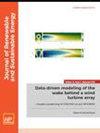Assessment of a combined heating and power system based on compressed air energy storage and reversible solid oxide cell: Energy, exergy, and exergoeconomic evaluation
IF 1.9
4区 工程技术
Q4 ENERGY & FUELS
引用次数: 0
Abstract
The electricity grid with high-penetration renewable energy sources has urged us to seek means to solve the mismatching between electricity supply and demand. Energy storage technology could accomplish the energy conversion process between different periods to achieve the efficient and stable utilization of renewable energy sources. In this paper, a hybrid energy storage system based on compressed air energy storage and reversible solid oxidation fuel cell (rSOC) is proposed. During the charging process, the rSOC operates in electrolysis cell (EC) mode to achieve the energy storage by converting the compression heat to chemical fuels. During the discharging process, the cell operates in fuel cell mode for electricity production and the gas turbine is conducted to recover the waste heat from cell. To evaluate the comprehensive performance of the proposed system, the energy, exergy, and exergoeconomic studies are conducted in this paper. Under the design condition, the results indicated that the proposed system is capable of generating 300.36 kW of electricity and 106.28 kW of heating; in the meantime, the energy efficiency, exergy efficiency, and total cost per unit exergy of product are 73.80%, 55.70%, and 216.78 $/MWh, respectively. The parametric analysis indicates that the increase in pressure ratio of air compressor, steam utilization factor of rSOC stack under EC mode and current density of the rSOC stack under EC mode reduce exergy efficiency and total cost per unit exergy of product simultaneously, while the increment of operating pressure of rSOC stack under FC mode enhances the exergy efficiency and decreases total cost per unit exergy of product. The multi-objective optimization is carried out to improve the comprehensive performance of the proposed system, and the results expressed that the best optimal solution has the exergy efficiency and total cost per unit exergy of product of 65.85% and 187.05 $/MWh, respectively. Compared to the basic operating condition, the improvement of the proposed system has led to the maximum enhancement of 20.32% in exergy efficiency and 18.60% in total cost per unit exergy of product.基于压缩空气储能和可逆固体氧化物电池的热电联产系统评估:能量、放热和放热经济评价
可再生能源高渗透率的电网促使我们寻求解决电力供需不匹配问题的方法。储能技术可以完成不同时段之间的能量转换过程,实现可再生能源的高效稳定利用。本文提出了一种基于压缩空气储能和可逆固体氧化燃料电池(rSOC)的混合储能系统。在充电过程中,rSOC 以电解池(EC)模式运行,通过将压缩热转换为化学燃料来实现储能。在放电过程中,电池以燃料电池模式发电,并通过燃气轮机回收电池的余热。为了评估拟议系统的综合性能,本文进行了能量、放能和外部经济性研究。结果表明,在设计条件下,所提系统可发电 300.36 kW,供热 106.28 kW;同时,能效、放能效率和单位产品放能总成本分别为 73.80%、55.70% 和 216.78 $/MWh。参数分析表明,在 EC 模式下,空气压缩机压力比、rSOC 烟囱蒸汽利用系数和 rSOC 烟囱电流密度的增加会同时降低单位产品的能效和总成本;而在 FC 模式下,rSOC 烟囱运行压力的增加会提高单位产品的能效,降低单位产品的总成本。通过多目标优化来提高拟议系统的综合性能,结果表明最佳优化方案的单位产品能效和总成本分别为 65.85% 和 187.05 美元/兆瓦时。与基本运行条件相比,改进后的拟议系统最大提高了 20.32%的能效和 18.60%的单位产品总成本。
本文章由计算机程序翻译,如有差异,请以英文原文为准。
求助全文
约1分钟内获得全文
求助全文
来源期刊

Journal of Renewable and Sustainable Energy
ENERGY & FUELS-ENERGY & FUELS
CiteScore
4.30
自引率
12.00%
发文量
122
审稿时长
4.2 months
期刊介绍:
The Journal of Renewable and Sustainable Energy (JRSE) is an interdisciplinary, peer-reviewed journal covering all areas of renewable and sustainable energy relevant to the physical science and engineering communities. The interdisciplinary approach of the publication ensures that the editors draw from researchers worldwide in a diverse range of fields.
Topics covered include:
Renewable energy economics and policy
Renewable energy resource assessment
Solar energy: photovoltaics, solar thermal energy, solar energy for fuels
Wind energy: wind farms, rotors and blades, on- and offshore wind conditions, aerodynamics, fluid dynamics
Bioenergy: biofuels, biomass conversion, artificial photosynthesis
Distributed energy generation: rooftop PV, distributed fuel cells, distributed wind, micro-hydrogen power generation
Power distribution & systems modeling: power electronics and controls, smart grid
Energy efficient buildings: smart windows, PV, wind, power management
Energy conversion: flexoelectric, piezoelectric, thermoelectric, other technologies
Energy storage: batteries, supercapacitors, hydrogen storage, other fuels
Fuel cells: proton exchange membrane cells, solid oxide cells, hybrid fuel cells, other
Marine and hydroelectric energy: dams, tides, waves, other
Transportation: alternative vehicle technologies, plug-in technologies, other
Geothermal energy
 求助内容:
求助内容: 应助结果提醒方式:
应助结果提醒方式:


